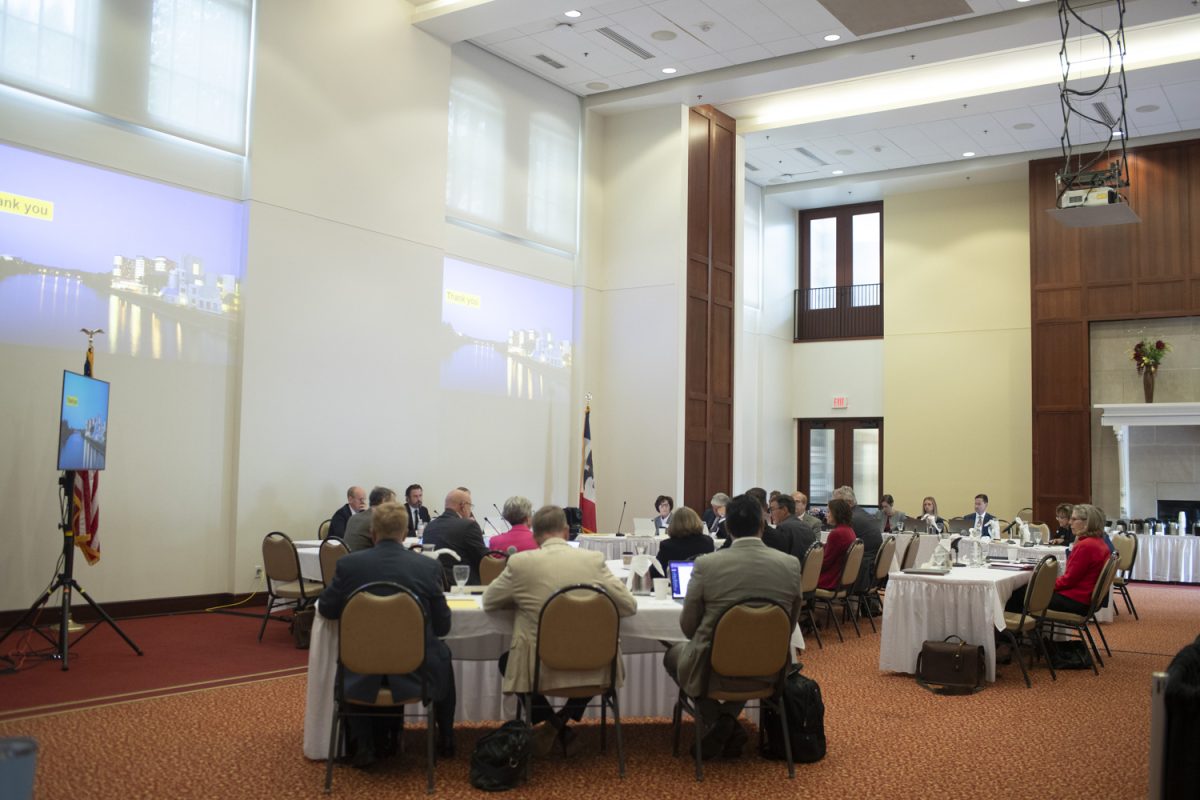The Iowa Board of Regents, which governs each of the state’s three public universities, is identifying new ways to assure compliance with state laws that restrict programs focused on diversity, equity, and inclusion, or DEI.
The regents received a report from Chief Academic Officer Rachel Boon and Board Counsel Aimee Claeys on Thursday outlining the efforts to comply with new state law and provisions to remain in compliance.
The law, SF 2435, was signed by Iowa Gov. Kim Reynolds on May 9, and it prohibits any DEI office, employment of staff tasked with duties of a DEI office, and requiring anyone providing a DEI statement and giving preferential consideration to anyone on DEI principles.
This is because DEI programs have been under review since March 2023, under a directive from Iowa Gov. Kim Reynolds. That review led to the restructuring of the DEI offices at the University of Iowa and the complete elimination of those offices at Iowa State University and the University of Northern Iowa.
Now, more changes are coming.
Claeys said the staff tasked with reviewing these programs are exploring changing Board policies surrounding statements the universities can make and updating social media policies for the three universities.
She said the universities are also in the process of creating committees and councils tasked with oversight of these new mandates, which will likely be complete by December. Boon said there will also be an annual report, starting in December, that will be presented to the regents annually to assure compliance with state law.
Regent David Barker thanked the review staff for their work compiling their report, and he said more work needs to be done to avoid the institutionalization of DEI programs and policies.
“In my opinion, this report is only a start,” Barker said. “The university itself should be neutral on politics and controversial issues, as suggested by the Kalven Report from the University of Chicago. When a university, as an institution, proclaims something controversial to be true, it chills the freedom of professors and students to come to their own conclusions.”
He said this report suggests the remaining offices that were engaged in DEI programming are no longer performing that function, but he believes that conclusion was inaccurate.
“Promotion of these ideas has been so widespread in university administration that achieving compliance will take a great deal of effort. Strategic plans still need to be changed, and our presidents need to strongly communicate that they expect our universities to follow the spirit of the law, not find ways around it,” he said.
Regent Nancy Dunkel said the report was comprehensive, but she thinks they need to have a student perspective. The regents have a student regent position; however, that seat has been vacant since former Student Regent Abby Crow stepped down over the summer.
“We’re missing a student representative on our board,” Dunkel said. “When they were on the Board, they gave us that input. So we really need to put our efforts into getting that seat filled, so we can hear that as well because that’s the process. We hear what the students are saying.”
Regent Jim Lindenmayer said he believes the actions to remove DEI from institutions is the right one, but he said that Diversity, Equity, and Inclusion, as a concept, is something that people should value.
RELATED: UI to restructure, rename DEI Office to Division of Access, Opportunity, and Diversity
“This has come from a political movement, in my belief,” Lindenmayer said. “That’s where the tussle has come in — it’s that we’ve institutionalized these things and maybe taking them too far in some instances, maybe not far enough in others.”
The new law does have certain exceptions to what is considered a DEI office. Perhaps most notably, student organizations are exempt; however, sweeping changes to DEI programs have been implemented at the UI toward these offices and the university’s ability to support such initiatives.
So far, the UI has restructured two of its offices, the Office of Institutional Equity and the Center for Inclusive Academic Excellence, into one division called Access, Opportunity and Diversity. The UI Office of Inclusive Education and Strategic Initiatives, identified by the report as primarily responsible for the university’s DEI efforts, was eliminated.
Through the restructuring, 11 full-time DEI positions were eliminated, including six positions that were held vacant during a hiring freeze resulting from the Regents review. The report states the UI saved $868,219 for the 11 positions, which are now being directed to other student success and programming needs.
The Board is still conducting a review of the UI’s cultural houses.
For cultural houses, the university can maintain these spaces for student organizations, which are exempt from the new law; however, the UI has eliminated two coordinator positions for the cultural houses and restructured the remaining staff to provide oversight of the spaces.
SF 2435 will go into law on July 1, 2025.



